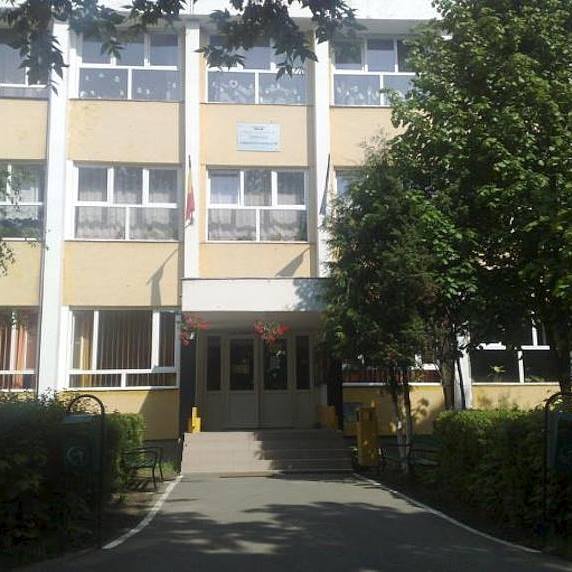
"Friedrich Schiller" Gymnasium School is located in a neighboring area of Tirgu Mureș.
The vast majority of students come from disadvantaged backgrounds and from rural areas, being the only Gymnasium School in Mureș County that has three teaching sections: Romanian, Hungarian and German. The parents of these students are working abroad, and children are left in the care of grandparents, who make a living from field work, unable to support them for online education.
The parents of these students are working abroad, and children are left in the care of grandparents, who make a living from field work, unable to support them for online education.
This educational institution has a number of 925 students from which 282 preschoolers, 295 primary school students, 282 secondary school students with full-time attendance, and 136 students with part-time attendance.
The school has a unique form of education in Mures County, part-time attendance education for grades 5-8, these students are coming from the Roma minoritiy, have a criminal record, are on probation and 80% drop out of school.
The only motivation for them to attend school is to receive social assistance, and online education is a great unknown to them, the only means of communication with them is the school website, but many don’t even know how to access it.
On the other hand most of primary and secondary school students (full-time attendance) do not know how to use information technology. "Friedrich Schiller" Gymnasium School has 47 study groups, 27 classes (at school), 12 group rooms in kindergarten, a physicschemistry laboratory and a computer laboratory with outdated computers received from donations from our partners from Germany. We have a team of 80 teachers, many of whom are substitute teachers, and in the German section where there is a shortage of teachers, most are unqualified with higher education and after 2, 3 years leave the system for the private sector. This fact generates lack of communication, lack of continuity, 8 auxiliary teaching stuff and 21 non-teaching stuff, for who the computer is unknown, and communication is very difficult.
Given the current context, the pandemic of COVID-19 the only computer scientist in the school has many requests from the teachers: internet connection to different platforms, creating student codes, providing equipment to be able to broadcast live sessions, old teachers who lack the ability and the interest in online teaching.
The German School, an institution with preschoolers, primary cycle, secondary cycle including full-time attendance and part-time attendance education with a number of 960 students, wants to improve its management methods through the use of technology, especially since the old school management was not interested in information technology, teachers were not used to being informed by e-mail or attend school board meetings online.
The school board convocation was sent on paper, and moreover the teachers are reluctant to change, they refuse information technology, which drastically decreased the number of students, some classes risking being abolished. Since 2016, the concern for IT has been increased, setting up the school's website which is being improved from year to year, in 2018 a sponsorship was obtained from ROMGAz with 30 computers that were donated to children from disadvantaged backgrounds. With the support of the Parents' Association, the internet was installed in the school in 2019 via a wireless system. Thus, the school’s website was created in collaboration with RoEduNet. The school has installed an internet network in all classrooms, and this school year the Office 365 platform has been implemented.
By winning the Erasmus project "European values are all right" we became familiar with educational platforms, teamwork has improved, teachers are more receptive to change, communication by compartments is more efficient, and the number of students has begun to grow.
Școala Gimnazială „Friedrich Schiller”, fosta Şcoală Generală Nr. 16, situată în cartierul Aleea Carpaţi, unul dintre cele mai vechi şi mai pitoreşti din oraş, pe malul stâng al Mureşului, şi-a deschis porţile la 1 septembrie 1969 
La 15 septembrie 1969 Şcoala Generală Numărul 16 şi-a primit noii elevi în strai sărbătoresc. Era o şcoală nouă, frumoasă şi modernă la acea vreme, fiind dotată cu 19 săli de clasă şi 2 laboratoare, în care la început au învăţat elevii a două secţii: română şi maghiară, cărora, dintr-o nevoie de a învăţa în limba maternă, peste numai câţiva ani li s-au alăturat şi elevii secţiei germane.
Şcoala şi-a definit specificul, păstrat cu consecvenţă şi mândrie până azi, aceea de a fi singura instituţie de învăţământ din oraş cu predare în trei limbi materne: română, maghiară şi germană. De aceea este cunoscută şi în prezent de majoritatea cetăţenilor din oraşul nostru ca „Şcoala germană”. Şi acest fapt a fost unul din motivele pentru care s-a optat ca şcoala să fie personalizată şi să poarte numele uneia dintre cele mai mari personalităţi ale culturii germane şi universale, „Friedrich Schiller”, denumire reprezentativă, care reflectă aspectul multicultural al instituţiei noastre, reprezentate de cele trei secţii la nivelul învăţământului preşcolar, primar şi gimnazial. Deci, ca o recunoaştere a celor ce şi-au dorit să studieze într-o limbă cu largi deschideri spre cultura universală şi ca un semn al toleranţei şi prieteniei faţă de semenii noştri germani, şcoala a primit, începând cu 1 Decembrie 2005, numele de Gimnaziul „Friedrich Schiller” Tg. Mureş.
Începând cu anul şcolar 2008 oferta educaţională a şcolii cuprinde de asemenea un program de frecvenţă redusă, 8 clase - 4 clase secția română, 4 clase secția maghiară.
Grădiniţa „Raza de soare”, care şi-a deschis prima oară porţile în 1969, a devenit structură a Școlii Gimnaziale „Friedrich Schiller” începând cu anul şcolar 2013. Aici învaţă preşcolarii a două secţii: română şi maghiară.
Misiunea școlii se centrează pe formarea unor tineri adaptaţi unei societăţi în continuă schimbare, în raport cu interesele şi aptitudinile lor, în concordanţă cu cerinţele pieţei de muncă, prin promovarea spiritului democratic, a identităţii sociale şi culturale, a toleranţei şi a diversităţii în spaţiul European.